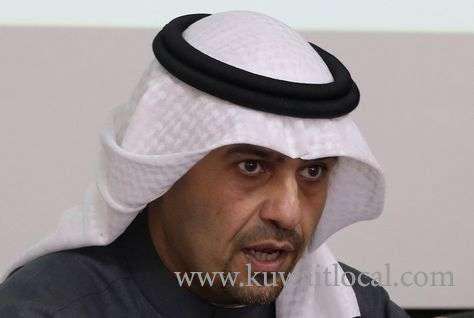Latest News
- Court Sentences Bank Employee To 5 Years For Embezzling 100,000...
- Fake ‘Sheikh’ Sentenced To 2-yr As Court Overturns Verdict
- Justice Ministry New Service On The Sahel App
- Ministry Probes 68 Cases Of Illegal Charity, Funds Collection
- Globally, Kuwait Is Among The Top Consumers Of Incense And Oud O...
- Decrease Seen In Foreign Investment
- Kuwait Customs Seized 2 Containers Laden With Tobacco At Shuwaik...
- Unpaid Salaries, Accountant Beaten Up By Workers
- The Sahel App Was Not Hacked, A Spokesman Claims
- Four Expats Arrested For Stealing Copper Cables Worth 60,000 Din...
- Indian National Died In Abdalli Car Accident
- Work Permits And Foreign Worker Transfers Are Amended By PAM
Kuwait Reforms To Focus On Government Cuts, Not The Public's Wallet

Kuwait’s government is preparing to unveil a fresh package of fiscal reforms to shrink the country’s budget deficit and reduce its dependency on oil revenues.
But any fiscal tightening will hit the government – not the public – and no further subsidy cuts are planned, according to finance minister Anas Khaled Al Saleh.
The first version of the National Program for Fiscal and Economic Sustainability (FES) was published in March 2016 and includes measures such as subsidy cuts, which had already been partially implemented.
A revised version, based on progress made in the past year, is set to be published in the coming weeks. In an exclusive interview with Arabian Business, Al Saleh said its focus is on achieving greater efficiencies within government — “tightening belts within the house rather than touching the pockets of citizens”.
Kuwait fell into deficit in 2015 for the first time since 1999 and has forecast the shortfall at $25.9 billion for the 2017-18 fiscal year. Meanwhile, hydrocarbons make up more than 90 percent of Kuwait's state revenues.
Al Saleh said: “There is no doubt we are faced with a fiscal deficit after many years of comfortable surplus ... As a minister of finance there are two main challenges I have to wake up to and deal with every day.
“The first is the short-term challenge, to close down the deficit, and the other is the medium to long-term one, diversifying the economy.
“We still have 90 percent of our revenues coming from oil. Like many GCC states, we are oil dependent and this is definitely not sustainable. But we are dealing with it now and we are dealing with it even if the oil price goes back up to $100 per barrel.
“We have a set of reforms we are now revamping to be more efficient. We’ve been in contact with industry associations from accounting, law, economics and other sectors to take long-term views on what is required, because we have to build up a consensus that reforms are necessary.”
The five-year plan to 2021 sets out measures focussed on reducing government expenditure and improving the business environment. Specific decisions included imposing tighter fiscal constraints on government entities, such as a ban on signing leases for new office space, and capping departmental budgets.
The government is also seeking to boost the private sector through public-private-partnerships, removing capital requirements for new businesses, and an insolvency law.
The first stage of the programme has started to yield positive results, such as $3.6 billion in savings for 2016/17, according to the Ministry of Finance.
Al Saleh told Arabian Business that as far as shrinking the deficit was concerned, top-down government rationalisation would bring about significant fiscal change.
“There is so much tightening we can do within the system that would pay us more [than revenue-raising measures such as the GCC’s value-added tax (VAT)],” he said.
“The procedures we are issuing in the new plan include more efficient tightening that will not hurt our tummies too much, but hopefully make sure we do not overeat.”
SOURCE : ARABIANBUSINESS
Trending News
-
 Eid Al Fitr 2024: Crescent Moon Not Sighted In Sau...
08 April 2024
Eid Al Fitr 2024: Crescent Moon Not Sighted In Sau...
08 April 2024 -
 Kuwait Implements Home Biometrics Services Ahead O...
14 April 2024
Kuwait Implements Home Biometrics Services Ahead O...
14 April 2024 -
 When Will Eid Al Fitr 2024 Take Place In Qatar, Ba...
08 April 2024
When Will Eid Al Fitr 2024 Take Place In Qatar, Ba...
08 April 2024 -
 On Sunday, The Meteorological Department Warns Of...
07 April 2024
On Sunday, The Meteorological Department Warns Of...
07 April 2024 -
 Kuwait Airways Provides Update On Flight Schedule...
14 April 2024
Kuwait Airways Provides Update On Flight Schedule...
14 April 2024 -
 Gathering For Eid Al-Fitr Prayers: Kuwaiti Citizen...
10 April 2024
Gathering For Eid Al-Fitr Prayers: Kuwaiti Citizen...
10 April 2024 -
 Kuwait Airways Introduces Convenient Home Luggage...
15 April 2024
Kuwait Airways Introduces Convenient Home Luggage...
15 April 2024 -
 Winners Of Kuwait National Assembly 2024 Elections
06 April 2024
Winners Of Kuwait National Assembly 2024 Elections
06 April 2024 -
 Bay Zero Water Park Kuwait: Summer Season Opens Ei...
11 April 2024
Bay Zero Water Park Kuwait: Summer Season Opens Ei...
11 April 2024 -
 An Egyptian Expat Dies At Kuwait's Airport
11 April 2024
An Egyptian Expat Dies At Kuwait's Airport
11 April 2024












Comments Post Comment